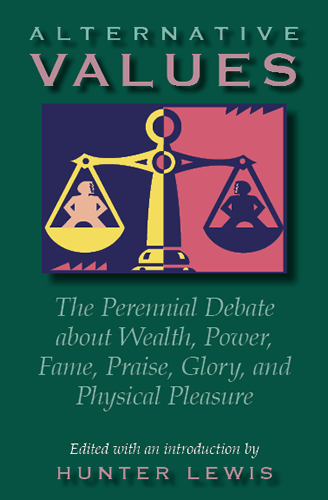Summary
Alternative Values brings together in one place what people have said about the pursuit of wealth, power, fame, praise, glory, and physical pleasure over the centuries. It is set up in the form of a debate: arguments that one should ardently pursue some of our most common desires are juxtaposed with arguments that pursuing them is a foolish or even tragic waste of one’s life.
In Plato’s Gorgias, Callicles argues that “The person who would truly live ought to allow personal desires to wax to the uttermost [and] when they have grown to their greatest . . . have the courage and intelligence to minister to them and satisfy such longings.” The Buddha, by contrast, warns that “From craving arises sorrow,” and Einstein agrees that “I am happy because I want nothing.” Epicurus provides a somewhat different perspective: “Personal pleasure [should be] the objective,” but the truest pleasure is “the absence of . . . turmoil in the mind.” Willa Cather counters that “There is only one big thing—desire,” and Bette Davis says proudly that “My passions were all gathered together like fingers that made a fist.” Thomas Hobbes agrees that “To have no desire is to be dead,” and Isaiah Berlin characterizes “the doctrine that . . . what I cannot have I must teach myself not to desire . . . [as] a sublime but unmistakable form of . . . sour grapes.”
This is truly a perennial debate, one that all of us must try to resolve for ourselves, but also a debate that can be enriched and clarified by paying close attention to what others have thought and said over the years.
About the Author
Hunter Lewis, co-founder of global investment firm Cambridge Associates, has written nine books on moral philosophy, psychology, and economics, including the widely acclaimed Are the Rich Necessary? (“Highly provocative and highly pleasurable.”—New York Times). He has contributed to the New York Times, the Times of London, the Washington Post, and the Atlantic Monthly, as well as numerous websites such as Forbes.com, Fox.com, RealClearMarkets.com, and Townhall.com. He has served on boards and committees of fifteen leading not-for-profit organizations, including environmental, teaching, research, cultural, and global development organizations.
Introduction
Wealth
Arguments against the Pursuit of Wealth
Basic Arguments
Philosophical Arguments
Arguments for the Pursuit of Wealth
Basic Arguments
Philosophical Arguments
Power
Arguments against the Pursuit of Power
Basic Arguments
Philosophical Arguments
Arguments for the Pursuit of Power
Arguments for the Pursuit of Power in Order to Do Good
Arguments for the Pursuit of Power in Order to Achieve Independence or Defend Oneself
Arguments for the Pursuit of Power for
Its Own Sake
Fame
Arguments against the Pursuit of Fame
Basic Arguments
Philosophical Arguments
Arguments for the Pursuit of Fame
Basic Arguments
Philosophical Arguments
Praise
Arguments against the Pursuit of Praise
Basic Arguments
Philosophical Arguments
Arguments for the Pursuit of Praise
Basic Arguments
Philosophical Arguments
Glory
Arguments against the Pursuit of Glory
Basic Arguments
Philosophical Arguments
Arguments for the Pursuit of Glory
Basic Arguments
Philosophical Arguments
Pleasure (Physical)
Sex
Arguments against the Free Pursuit of Sex
Basic Arguments
Philosophical Arguments
The Special Case of Adultery
Arguments for the Free (or Fairly Free) Pursuit of Sex
Basic Arguments
Philosophical Arguments
The Special Case of Adultery
Drink
Arguments against the Free Pursuit of Drink (or Similar Pleasures)
Basic Arguments
Philosophical Arguments
Arguments for the Free Pursuit of Drink
Miscellany
Arguments against the Pursuit of Wealth and Power
Arguments for the Pursuit of Wealth and Power
Arguments against the Pursuit of Wealth and Fame
Arguments against the Pursuit of Wealth and Praise
Arguments against the Pursuit of Wealth, Power, and Pleasure
Arguments against the Free Pursuit of Sex and Drink
Arguments for the Free Pursuit of Sex and Drink
Index
MISCELLANY
ARGUMENTS FOR THE PURSUIT OF WEALTH AND POWER
20. Those who are not envied are never wholly happy. It is a nobler fate to be envied than to be pitied.
AESCHYLUS, 525–456 BCE, Agamemnon I
21. As wealth is power, so all power will infallibly draw wealth to itself by some means or other.
EDMUND BURKE, 1729–1797, Speech in the House of Commons, February 11, 1780
22. The law may in a mad freak say that all shall have power except the owners of property; they shall have no vote. Nevertheless, by a higher law, the property will, year after year, write every statute that respects property.
RALPH WALDO EMERSON, 1803–1882, Politics
23. Men, such as they are, very naturally seek money or power; and power because it is as good as money.
RALPH WALDO EMERSON, 1803–1882, The American Scholar
24. To the lowly, the powerful and rich are as gods.
EURIPIDES, 485–406 BCE, Iphigenia in Tauris
25. Money is power in American politics. It always has been.
WILLIAM GREIDER, 1936–, Who Will Tell the People
26. So oblique is human judgment that we nearly always praise the lavish habits of princes, though they be joined with rapacity; more so, in fact, than we praise their parsimony, which is usually attended by a sacred regard for the property of others.
FRANCESCO GUICCIARDINI, 1483–1540, Storia d’Italia
27. It is much better to be envied than pitied.
HERODOTUS, c. 485–c. 425 BCE, Histories
28. We are . . . removed farther than ever away from the happy sons of earth who lord it over land and sea and men in the full-blown lustihood that wealth and power can give, and before whom, stiffen ourselves as we will by appealing to anti-snobbish first principles, we cannot escape an emotion, open or sneaking, of respect and dread.
WILLIAM JAMES, 1842–1910, Psychology X
29. Get place and wealth, if possible, with grace; If not, by any means get wealth and place.
ALEXANDER POPE, 1688–1744, Imitations of Horace
ARGUMENTS AGAINST THE PURSUIT OF WEALTH AND FAME
30. What is fame? an empty bubble; Gold? a transient, shining trouble.
JAMES GRAINGER, 1721–1766, Solitude 1.96
